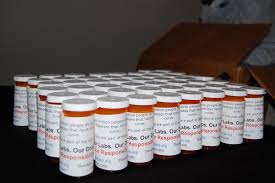Biotin is the hot new word in multiple sclerosis research. Current MS treatments play defense, reducing the number of attacks and further disease progression. Biotin could finally turn MS treatment into offense.
What’s biotin and why should I care?
Biotin
- Known aliases: vitamin B7, vitamin H
- Current whereabouts: readily available in food, also seen on drugstore shelves
- Current activity: supports a healthy metabolism by breaking down fats, proteins, and carbohydrates into forms your body can use
- Suspected recent activity: providing hope that progressive MS can be treated
Do you get enough biotin? Most people have no idea. That’s because biotin is in so many foods you eat – whole grain bread, nuts, meat, vegetables – that you get what you need.
Pregnant women may be encouraged to up their biotin. All they have to do is take a prenatal vitamin, and mission accomplished.
Some folks take biotin supplements to improve hair and nail health. The jury’s still out on whether biotin helps. Two studies showed less nail splitting and otherwise healthier nails, but they included so few people in their studies that no one’s drawing conclusions on the population as a whole.
Why should I care?
When I got diagnosed back in the olden days, there weren’t many treatments out there, and they were approved for relapsing-remitting MS (RRMS). I was told about the ABC disease-modifying therapies (DMTs) – Avonex, Betaseron, and Copaxone. Within days of my diagnosis, the ABC changed to CRAB, as Rebif became the first drug to get fast-passed through the FDA approval process.
Now, there are far too many DMTs for RRMS, and the list keeps growing. Even better, some are pills or infusions that don’t require self-injection.
When I started Avonex in 2002, I had to drive a thick, 1.25 inch long needle into my arm or leg muscles every week. I do NOT miss that.
Meanwhile, folks with primary or secondary MS (PPMS or SPMS) were left out in the cold. Do you have PPMS? You can count the available treatments for progressive MS on one finger – Ocrevus. A year ago, you could count the treatments for progressive MS on no fingers.
At least you’ve got something. As one of the many MS warriors whose RRMS has turned into SPMS, we’ve got diddly squat. Oh, we still take our DMTs to reduce the risk of future attacks, but other than that, well… *crickets*.

Help me obi-wan-biotin…you’re my only hope
OK, it’s not that dramatic. Well, it could be, but it’s not yet.
The first two studies have shown solid results. The first study had a small sample, but there was evidence that biotin could increase energy and reduce pain. A study in France used high-dose biotin in the MS centers and noted an impact on both disability level and progression. Now there’s a large Phase III clinical trial recruiting patients from MS centers across the US, Canada, and Europe.
The studies had been focusing on vision and energy levels, but the study results were also showing improved ratings on the Expanded Disability Status Scale (EDSS). That’s the test doctors use to determine a patient’s level of disability that goes from 0 (normal neuro exam) to 10 (death by MS) in half-point increments.
Early studies suggest high-dose biotin could help people with primary or secondary MS.Click To Tweet
So, time to pick up some biotin?
Hold your horses.
Talk to your doctor first
I know, I sound like one of those TV drug commercials. But MS is not a one-size-fits-all disease, so you need to sit down with the neurologist to see whether it’s worth trying it now. Your doctor might be able to get you into the clinical trial, which would pay for medicines, exams, and other study-related activities.
Don’t be on your own
High dose means much higher than your standard dose.
Typical drugstore supplements have 1 milligram of biotin (1000 micrograms). High dose biotin equals 300 milligrams – a day.
Do you want to take 300 pills daily?

Compounding pharmacies can make 100mg pills of pure biotin for you. That way, you’re taking 3 pills – morning, afternoon, night. Your doctor can write the prescription. Working directly with a compounding pharmacy is the best way to guarantee that you’re getting what you’ve paid for.
You can also find 100mg pills online, and the sellers may not require a prescription. They’re cheaper than a compounding pharmacy, but are you sure you’re getting what you’ve ordered? The FDA Consumer Update has good advice.
High-dose biotin doesn't mean take 300 pills a day. Good things can come in small packages.Click To Tweet
High dose biotin is expensive
The good news? It’s cheaper than buying hundreds of pills from the drugstore.
The Internet is a cheaper option, but you’re still looking at about $50-60 a month. My MS Center’s compounding pharmacy prepares a three-month supply for $240 ($80/month).
Another reason to talk to your doctor first – why spend that much money if it won’t help you?
It’s not a quick fix
It would probably be months before you notice any improvement, if you have any at all. There’s no guarantee it will work for you, so you could be getting my hopes up just to hit a brick wall.

Let’s talk about Me!
So, what can I share about my experience so far?
My MS center is participating in the clinical trial, so my neuro asked if I wanted to be considered for the study. I’m a research geek, so I said sure.
At my next appointment, my neuro broke the news that I wasn’t eligible for the study. I looked at the study exceptions. Since I take Botox shots for my spasticity, I was voted off the study and had to bring them my torch.
All was not lost. He then told me that he thought that high-dose biotin could help improve my mobility. He’s a research geek too. That’s a big reason why we work well as a team. Maybe I’ll get a better score the next time I have to do that walking down the hall test.
Then it was time to talk pluses and minuses:
The Good: If I had qualified for the study, I might have been put in the placebo group. So while I would be contributing to the public good, I’d be taking pills that would do nothing for me. Taking biotin outside of the study meant I would definitely be taking the real thing.
Selfish, I know. But you try dragging a rolling walker up and down steps a few times and tell me you wouldn’t be interested in an alternative.
 The Bad: Since I didn’t qualify for the study, I’d be shelling out the bucks for the meds. Add yet another cost to my MS treatment.
The Bad: Since I didn’t qualify for the study, I’d be shelling out the bucks for the meds. Add yet another cost to my MS treatment.
The Ugly: My neuro said I probably won’t see much improvement until I’ve been on the biotin for six months. Do I look like a patient person to you?
Hmmm…this was not going to be an easy decision.

After a few kicks and pokes, the voice of reason in my head decided to wake up and help me decide. I realized…
I have Secondary Progressive Multiple Sclerosis. Before this biotin talk, my treatment plan discussions with my neuro were pretty boring. Eat healthy food. Exercise regularly. Don’t play in traffic. Be kind, rewind. Next appointment, the list would be pretty much the same.
Then we started talking about biotin. It’s not guaranteed. But if I don’t do anything, I have zero chance of improving. I’ve just been offered a chance, and people with SPMS hadn’t been able to say that before. Yes, it will cost me some money. I’m getting the information from a trusted source based on promising research.
Do I stay where I am, or do I try to make a change?

I’ll have an update for you in about six months.
Now it’s your turn…
At your next appointment, have a talk with your doctor. Bring paper and a pen with you so you can take notes.
- Talk about your treatment plan. Are there any changes you should make?
- Ask about research. Is there anything coming up that could impact your treatment?
Remember, you’re part of a team. Your doctor has the terrific combination of medical knowledge and your personal condition to advise you. Ultimately, you’re the one making the decisions and implementing a treatment plan that feels right for you.
I want to be part of your team too! I’d love to hear how you’re plan is going.

